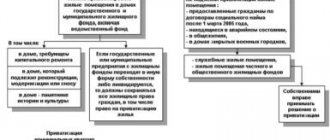Housing relations in Russia are characterized by great diversity.
Dear readers! The article talks about typical ways to resolve legal issues, but each case is individual. If you want to find out how to solve your particular problem , contact a consultant:
+7 (499) 110-56-12 (Moscow)
+7 (812) 317-50-97 (Saint Petersburg)
8 (800) 222-69-48 (Regions)
APPLICATIONS AND CALLS ARE ACCEPTED 24/7 and 7 days a week.
It's fast and FREE !
Individual premises are subject to different legal regimes that are no longer regulated by current legislation.
Some citizens moved in during the Soviet era, and the buildings changed their status and owners several times.
Therefore, a big problem today is the transfer of dorm rooms to private ownership.
What is this
Privatization of housing is the voluntary free transfer of apartments, houses, allocated rooms and other residential premises from state and municipal property to the ownership of citizens permanently residing in these objects.
Initially, the privatization of the housing stock was supposed to be completed with the adoption of the new Housing Code of the Russian Federation. However, after this the deadline was postponed many times.
The denationalization of apartments and rooms was supposed to end on March 1, 2020, but in February of this year the State Duma decided to make the process indefinite.
Subject to certain conditions, each person has the right to transfer housing rented under a social tenancy agreement into his own ownership free of charge.
What laws govern
- The main provisions regulating the process of denationalization of residential premises are contained in Law No. 1541-1 of July 4, 1991 “On the privatization of housing stock in the Russian Federation.” This act reflects the basic requirements for citizens applying for housing ownership, as well as the requirements for these objects.
- Also very important are some provisions of Law No. 189-FZ of December 29, 2004, which concerns the implementation of the Housing Code of the Russian Federation.
- Article 7 contains an indication of the application of the code in the event of transfer of hostels to the balance of local municipalities.
Studying the Housing Code of the Russian Federation will be useful to citizens who are interested in the privatization of hostels. It contains the rules for concluding and executing social tenancy agreements, classifying houses as dormitories, etc.
Who is eligible
Privatization of a dorm room is possible if the citizen meets the following criteria:
- has a Russian passport;
- permanently registered at the premises in question;
- has not previously received property as part of privatization;
- submitted all documents necessary for registration.
Article 11 of Law No. 1541-1 contains a clause that allows you to participate in privatization again if a citizen received property for the first time before the age of 18.
Requirements for residential premises
There are several categories of housing that cannot be privatized according to Law No. 1541-1:
- objects in disrepair;
- housing located in closed military camps;
- dormitories;
- service living quarters.
Dormitories are intended for temporary residence of citizens during service, work or study.
Law No. 1541-1 establishes a complete ban on the transfer of such residential premises into private hands.
But in practice, rooms in dormitories can be privatized if the residential buildings were managed by enterprises or institutions and were transferred to the balance of local governments.
Residents in such premises live on the basis of social tenancy agreements in accordance with Article 7 of Law No. 189-FZ.
The procedure for privatizing a dorm room
From a legislative point of view, the privatization procedure in this case is no different from applying for the denationalization of apartments and houses.
How to obtain a certificate of privatization of an apartment if it is lost?
Where to register the privatization of a land plot? Find out here. If privatization is possible, then the standard algorithm should be followed:
- Preliminary consultation and obtaining consent from all registered persons. Some people may not live in the room, but remain registered there. In this case, legal proceedings may be required to force the cancellation of registration.
- Obtaining the necessary documents. A citizen will need to send requests to various departments to confirm his right to privatization. So, you will probably need to draw up a technical passport for the room.
- Submitting an appeal. This can be done through the MFC, so as not to make a mistake with the address and name of the department.
- Application analysis and decision making. The property department examines the submitted documents, checks information about the applicant and the property. This may take up to 2 months. After consideration of the application, a response is sent regarding approval of privatization.
- Drawing up a contract for the gratuitous transfer of premises. To do this, you need to personally contact your local government authority. The agreement will be drawn up according to the sample and signed by an authorized official based on the previously adopted decision of the property department.
- Registration of property rights. The new owner submits an application, contract and passport to the Rosreestr office. An employee of the institution enters the necessary information into the Unified State Register. After this, the privatization procedure will be completed.
Where to begin
First of all, you should find out who is in charge of the hostel at the moment.
If the building is owned by a local municipality, and a citizen uses the room under a social lease agreement, then he has the right to privatize the home.
A situation is possible when a local government body, within its competence, decides to transfer premises in dormitories as part of privatization.
Thus, in Tyumen, the City Duma decided to provide a certain category of residents with the right to privatize rooms. In 2020, according to the new law, public sector employees who have worked in this area for 20 years or more will be able to obtain ownership rights to privatize housing in a dormitory.
Under a social tenancy agreement
If a citizen lives in a room under a social lease agreement, then he can privatize the premises without reservations.
In student
Privatization of the room in this case is unlikely.
A citizen receives the right to use such premises only for the period of receiving education at an educational institution that owns the dormitory or uses it with the right of operational management.
When living together
When applying for a job, citizens without a family were allocated so-called beds.
2 or 3 people lived in one room, each paying separately for the room.
When transferring hostels to the management of local authorities, it was necessary to conclude a social rental agreement with each of the residents and draw up a dedicated personal account.
According to the law, a property can be an isolated room, but not part of a room or common areas.
There is simply nothing to privatize when living together.
The way out in such a situation is to ask the administration of the hostel or the management of the owner organization to provide a separate room for living.
Step-by-step instruction
Privatizing a dorm room requires a certain procedure. They include collecting information about the owner of the property, the list of documents for registration, the cost of payments and fees.
In order to find out the owner of a room in a hostel, you should contact the MFC or Rosreestr. This can be done directly or through the State Services electronic portal. The cost of the statement is from 250 rubles. The electronic document is sent to the specified email within 5 working days.
We proceed further depending on the information received:
- If the owner is a populated area, then you can immediately go to the document collection point.
- If the owner is an organization, then you first need to transfer the room to the balance of the municipality and conclude a social rent agreement for it.
When a room is on the balance sheet of an organization, it is first transferred to the balance sheet of the municipality and then privatized. Only municipal housing can be privatized. Service housing cannot be privatized from the organization’s balance sheet. You must first change the status and conclude a social rent agreement, and then the opportunity to privatize it appears.
This requires valid reasons (retirement, work injury, etc.). If there is an opportunity to privatize at a particular enterprise, then the citizen will be required to submit an application in a form developed by this institution.
Next, the administration of the institution and the administration of the municipality are responsible for changing the status and transferring from balance sheet to balance sheet. In this case, the citizen simply waits for the end of the procedure.
Read more about the privatization of service housing here.
The state has determined a list of categories of citizens who have the right to conclude a social rental agreement with the municipality. This:
- low-income citizens (the procedure for recognition as such is prescribed in the regulatory legal acts of the Russian Federation);
- citizens with disabilities;
- foreign citizens (if there are compelling reasons);
- citizens registered as needy (the criteria are specified directly in the law);
- other citizens specified in the regulatory legal acts of the constituent entities of the Russian Federation.
After a positive decision and the queue has moved, the authorized person invites the person to enter into a social rental agreement. It contains the name of the authorized body, its address, characteristics and cadastral number of the residential premises, information about the person and his family members, information about encumbrances, debts, rights and obligations of the parties, signatures and the seal of the municipality.
Download the standard social tenancy agreement from this link.
Collecting documents
Citizens should clarify what documents are needed to privatize housing. Typically this could be:
- a personally completed application (registered by a municipal employee) with signatures of all privatization participants;
- refusals of citizens who do not want to privatize a room are certified by a notary or an employee of the receiving department at the reception;
- original passports of the citizen and his family members, copies of birth certificates (certified and verified by a municipal employee);
- social rent agreement or move-in order, warrant;
- personal account statement, certificate of registration;
- technical documentation (if available).
We invite you to read: How to privatize the adjacent territory of an apartment building in 2020
The list of papers may differ depending on the location of the hostel (region of the Russian Federation). If the entire package is available, the municipality signs an agreement on the transfer of ownership of the dorm room and puts a stamp. This serves as the basis for registering a residential premises.
To privatize dorm rooms, a special agreement is concluded with the municipality or a specific organization on the transfer of ownership of housing to a citizen or several persons. The forms of forms differ in different regions of the Russian Federation, but the general structure is approximately as follows:
- document's name;
- name of government body or organization, address and contact details;
- information about the transfer of ownership of the property (technical characteristics, address, cadastral number);
- names of persons living together (including minors);
- if there are several future owners, then the size of the shares is indicated;
- record of no encumbrances;
- information about the number of copies;
- signatures of the parties;
- seal of the authorized body or organization.
For an example of a contract for the transfer of ownership of a room, see this link.
Registration of ownership of a real estate property occurs only if there is a certain list of documentation required by Rosreestr or the MFC. The cost of services is 2000 rubles. Required:
- application for registration of rights (the form is filled out by the MFC registrar at the reception, there is no need to fill out in advance);
- a social tenancy agreement or an order with a resolution from an authorized official of the municipality or organization, as well as an agreement for the transfer of ownership of housing;
- receipt of payment of state duty;
- passports and birth certificates for minors;
- extract from the house register;
- refusals of privatization from persons living together with the future owner certified by a notary (if any);
- technical passport for a dorm room.
Required documents
To privatize a room, you need to submit the following documents:
- statement;
- applicant's passport;
- consent to privatization from all citizens registered in the premises, certified by a notary;
- notarized power of attorney in the name of the applicant from citizens who will receive a share in the privatized premises;
- social rent agreement;
- an order for obtaining a room or a copy of the relevant decision of the owner of the building;
- registration certificate for the premises;
- personal account statement;
- certificate of non-participation in privatization;
- information about the registration of the applicant’s minor children.
The absence of a social tenancy agreement does not indicate that a citizen does not have the right to privatization.
You can issue the relevant document at any time.
Statement
To officially apply for privatization, you need to fill out an application, a sample of which will be issued at the MFC.
The document reflects the following information:
- name of the body to which the appeal is sent;
- FULL NAME. applicant and passport details;
- information about the residential premises: area and address;
- composition of the applicant's family;
- Full name, passport details of each resident, date of registration, mark of consent to privatization and signature;
- date, signature, surname and initials of the applicant.
Photo: sample application
Regulatory documents
Is it possible to rent out a municipal apartment (room) {q} The possibility of subletting is established by Art. 81 Housing Code of the Russian Federation. This issue is regulated by Art. 76-79 Housing Code of the Russian Federation and Art. 685 of the Civil Code of the Russian Federation.
The list of diseases that prevent the conclusion of a contract is stipulated in Article 51 of the RF Housing Code.
Article 76 of the Housing Code of the Russian Federation establishes the norm for the area that can be leased. Article 77 of the LC stipulates the rules for drawing up, conditions, and validity period of the relevant agreement. Article 78 of the Housing Code states that the sublease agreement is compensated. In Art. 79 of the RF Housing Code stipulates the conditions for termination and termination of the contract.
Read on our website useful information about what to do in the event of the death of a responsible tenant. Also find out about the grounds for eviction and relocation from property received under a social tenancy agreement, as well as whether they can be exchanged.
We suggest you read: Is it possible to transfer money from a credit card to another card?
If you can privatize the room, then you will need the following documents.
Passports of all adult family members registered in the room. For minors, you must provide a birth certificate, and if the child is 14 years old, a birth certificate and passport.
Social tenancy agreement for privatized residential premises.
An order or extract from an order of an executive authority on the provision of a room. If you have lost your warrant, you can obtain a copy of the order of the executive authority in the city archive.
An extract from the personal account or from the house register at the previous registration address, if you registered in the hostel after July 21, 1991.
A document stating that you did not exercise the right to privatization at another place of residence, if you registered in a hostel after July 21, 1991. For the period from July 21, 1991 to January 31, 1998, this document can be issued by the BTI, the housing department of the local administration or another authorized body.
Documents with information for periods after January 31, 1998 are issued by Rosreestr.
A notarized refusal to participate in privatization with consent to privatize the premises for a selected family member in the event that several people are registered in the room, but they are privatizing for one. Each family member gives such a refusal. If minor children are registered in the premises, they are obligatory participants in privatization.
If you want to exclude them from privatization, you will need to obtain permission from the guardianship and trusteeship authorities. The guardianship gives such consent extremely reluctantly and only on the condition that the child’s ownership of another home is registered. And no worse and no less than the one from which the child is excluded from privatization.
An extract from a personal account or a certificate of family composition. It shows who is registered in the privatized premises.
Cadastral and technical passports, if Rosreestr does not have information about the premises or there were unauthorized redevelopments. They can be ordered from BTI.
Application for transfer of ownership of the premises to you. It is filled out when submitting documents. There is a sample in the administration of your city or on its official website.
The organization you contact to receive the service may request other documents - it depends on the specific case. Therefore, it is impossible to give an exhaustive list in advance. The collected documents can be submitted to the MFC or directly to the administration of your municipality.
Documents for privatization will be reviewed for up to two months and, as a result, an agreement on the transfer of ownership of the premises will be issued or a refusal will be issued. They may refuse, for example, if there was an illegal redevelopment, the house was declared unsafe, or the package did not contain all the documents.
If the reasons for the refusal can be eliminated - for example, by attaching missing documents or returning the premises to its original form - you can submit the application again after eliminating the violations. If the house is declared unsafe, then it will not be possible to privatize the room.
Registration through court
A municipal body may refuse privatization to a citizen’s appeal. The reasons may be different:
- no documents have been submitted;
- the premises are not subject to privatization;
- the applicant does not have the right to receive the property free of charge;
- the consent of not all registered citizens was obtained;
- other reasons.
A citizen can eliminate the shortcomings, if possible, or immediately appeal such a response in court. The case is considered on its merits, the court makes a direct decision to transfer the room into the ownership of the plaintiff or to refuse it.
When there is little chance of winning the case
The likelihood of owning a room is extremely low if the building is on the balance sheet of an enterprise and the person moved in there on the basis of an employment contract.
In this case, the court decision will not be made in favor of the applicant.
The norms of privatization legislation cannot be applied to such a situation.
What documents are needed
It will be necessary to familiarize yourself in advance with the documents that will be required in the event of privatization. In each case, the list of such may differ slightly. This moment is determined in each case individually.
It is possible to obtain a detailed list of documents required in a particular case from the municipal institution on whose balance sheet the property is located.
The standard set of papers, which is needed in almost all cases without exception, includes the following:
- social rental agreement - or an order for the use of a specific property;
- passports/birth certificates of all persons under 18 years of age;
- extended extract from the house register;
- a document confirming the fact that there is no debt to pay for housing and communal services;
- certificates establishing the fact of non-participation in the privatization of other residential real estate;
- real estate cadastral passport;
- technical documentation for the apartment;
- extract from Rosreestr.
The list of documentation may vary depending on different points.
The most detailed and accurate list will need to be obtained directly from the municipal authority. You can obtain information about which body has specific property on its balance sheet from Rosreetr or the MFC.
List of additional documents
The following documents may also be required:
- a document confirming the transfer of the hostel to the ownership of the municipality;
- consent of the guardianship and trusteeship authority for privatization (required if a child is registered in the room);
- a court decision recognizing a citizen as having limited legal capacity or incapacity, if such a person is registered in the room;
- documents confirming the existence of an employment relationship with the organization in whose economic jurisdiction or operational management the building was located (employment contract or work book);
- floor explication of the building.
Arbitrage practice
During legal proceedings, documents according to which the citizen moved into the hostel are studied.
Often such residential buildings were transferred to the balance sheet of various enterprises during repeated reorganizations.
The key point is which entity is the owner at the time a citizen applies for privatization.
If the building belongs to an enterprise or is assigned to a government agency, then the rooms are provided to citizens in connection with work in the relevant legal entities.
If the residential premises were provided without conditions regarding the terms of use or other restrictions, and the owner is a municipal entity, then privatization will be carried out.
How much does it cost to privatize a room?
One of the main features of the privatization process itself is that it is completely free and gratuitous.
All these points will need to be sorted out in advance. Nevertheless, certain expenses during such a procedure will still occur.
These include:
- payment of state duty - the amount depends on several factors at the same time, determined by the Tax Code of the Russian Federation;
- expenses for notarization - for example, if it is necessary to formalize a refusal of privatization or, conversely, consent to carry out such a procedure;
- payment for lawyers.
Before proceeding with privatization, the points outlined above will need to be sorted out. Thus, the likelihood of financial difficulties will be reduced to a minimum.
Separately, it is worth noting the need to pay for the work of hired employees in the form of lawyers. If the privatization process is carried out with their help, then the cost of services will depend on the complexity of the technical work, as well as a number of different other factors.
Typically, the cost of services ranges from 10 thousand rubles or more. An important point is also the territorial location. It will also be necessary to familiarize yourself with this point in a timely manner.
Questions and answers
Citizens also have questions regarding certain legal aspects of the privatization of dorm rooms.
Can they refuse?
Upon contacting the property department, a negative response may be received in 2 cases:
- the building is owned by an enterprise or department;
- the citizen received the right of residence for the period of study or work in the organization.
In the situations described, the rules do not allow privatization.
Is eviction justified if there is an apartment purchased with a mortgage?
In each specific case, you need to refer to the regulations on the provision of dorm rooms.
Is it possible to invalidate an apartment privatization agreement? What does privatization of a summer cottage give? Find out here.
Is it possible to challenge the privatization of an apartment after 20 years?
Read on. If housing was provided to a person when he got a job, after which the building was transferred into the ownership of a municipal entity, then the eviction will be unlawful.
But if premises are provided from a specialized fund, the person who bought the apartment with a mortgage must be evicted.
Since Article 99 of the Housing Code of the Russian Federation indicates that specialized premises are provided only to persons who do not have housing in a given locality.
If a citizen occupies a room while working or studying, the building is owned by a specific organization, then he does not have the opportunity to privatize the premises.
This right exists in the case where the room is provided under a social lease agreement, and the building belongs to the municipality.
Difficulties
Privatizing a dorm room can cause certain difficulties in the process of preparing and completing documentation. Sometimes situations may arise in which there is a lack of confirmation of employment or the presence of a large debt. But Russian laws provide solutions even in such cases.
There are situations in which there is no warrant or social tenancy agreement. A person or persons living with him can apply to the municipality at his place of residence to issue a duplicate in order to privatize the premises. Employees will also notify you about the possibility of obtaining the necessary documents, conditions and deadlines.
We suggest you read: Find out the amount of debt under enforcement proceedings
Confirmation of this right can be permanent registration at the place of residence in the passport. After issuing all missing papers, you can begin submitting an application to privatize dorm rooms. If the social rent agreement was concluded with other citizens, then the issuance of a duplicate is not required.
Russian legislation does not prohibit the privatization of dorm rooms with debts. But in most cases, persons living in the premises are required to pay the debt before the end of the procedure. Since the social lease agreement itself provides for timely payment of utility bills.
https://www.youtube.com/watch{q}v=vcIL1lAZc7c
For an affirmative resolution, a municipal official will need to add a clause to the official text of the contract allowing payment to be made after registration with Rosreestr (you need to look at regional legislation). In this situation, citizens have the right to go to court if they refuse to privatize a property.









